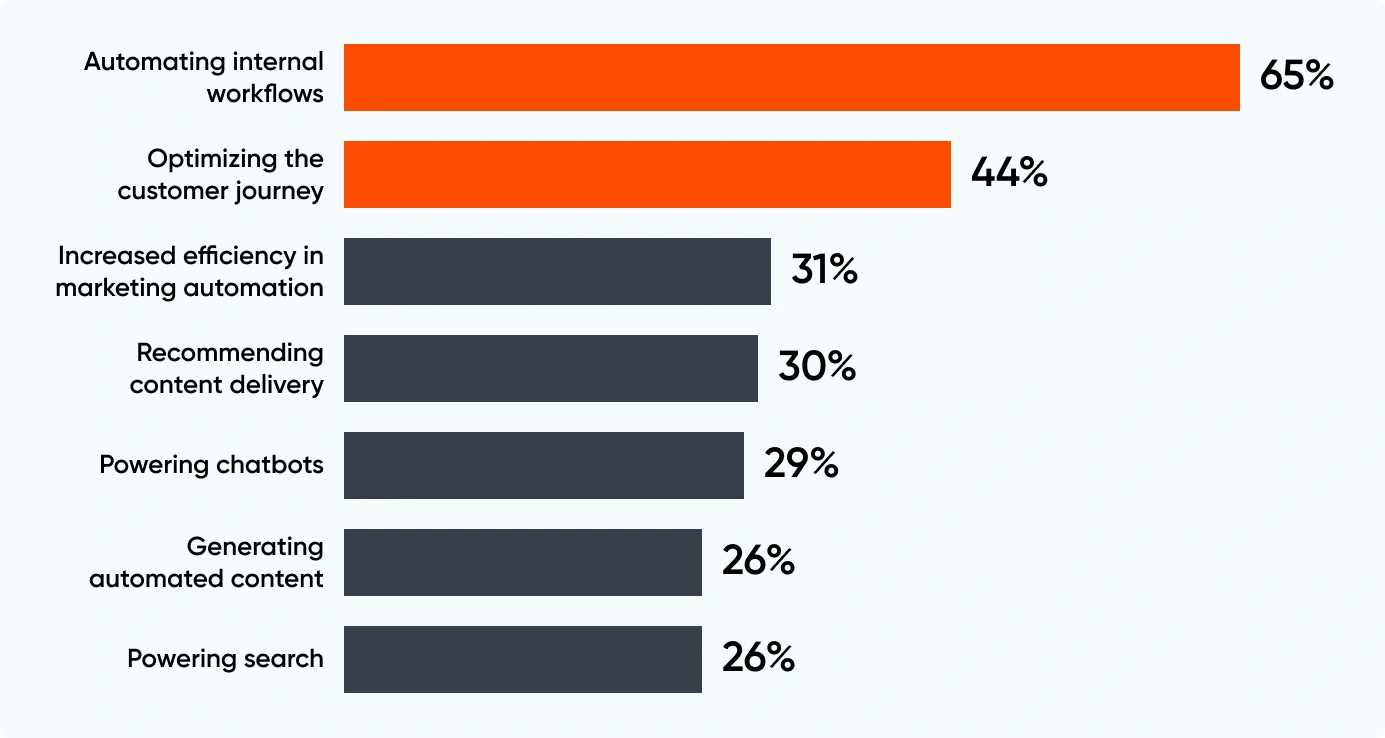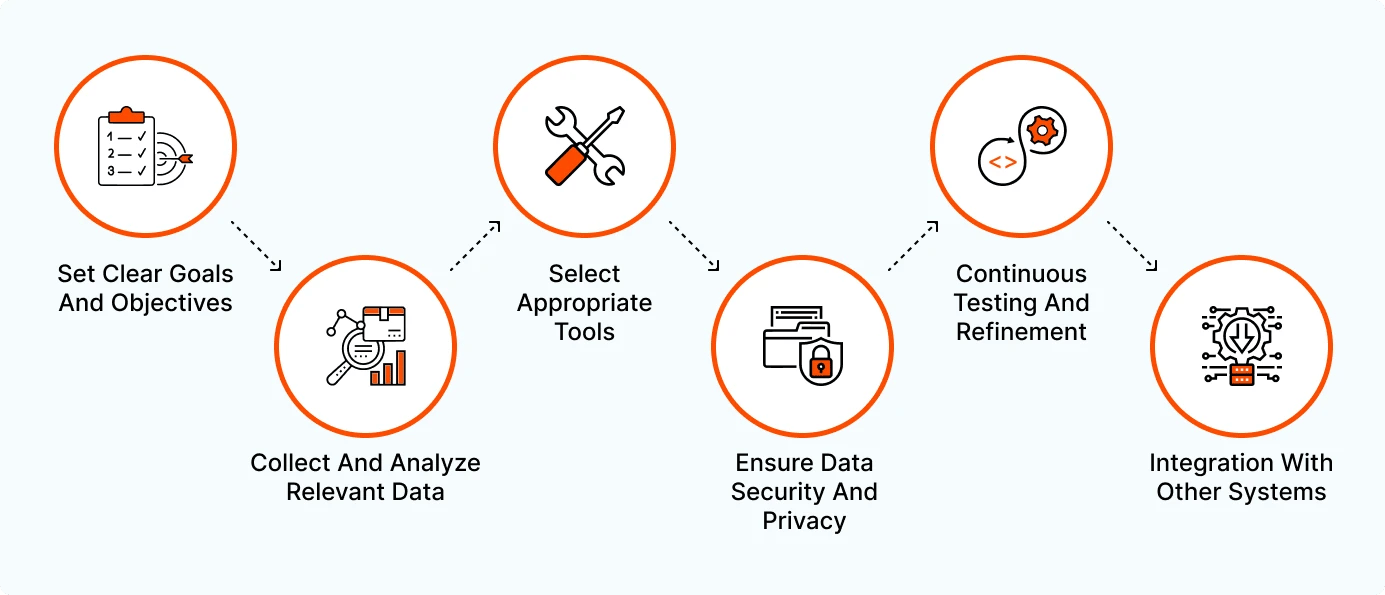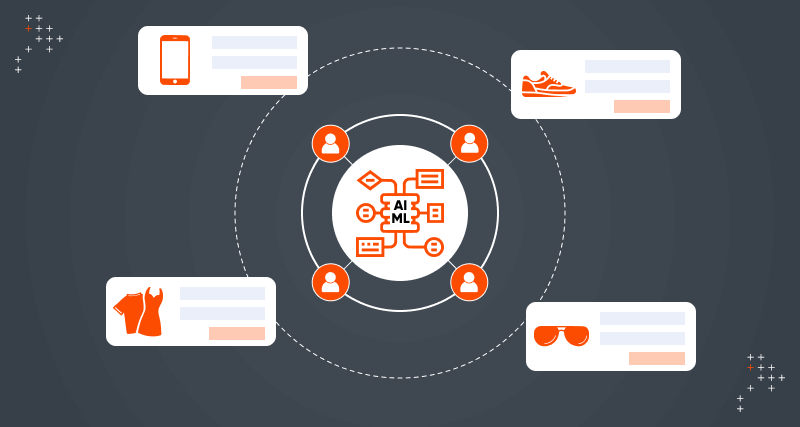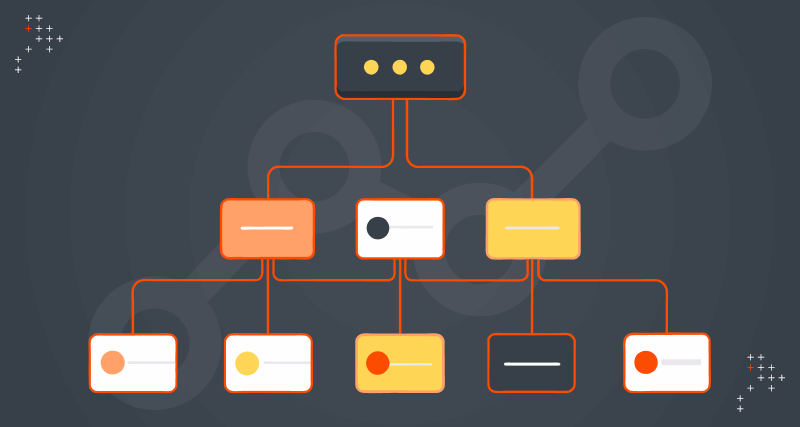DXPs help organizations to create and manage digital experiences for their customers. Gartner defines DXP as a cohesive and integrated technology designed to enable management, composition, optimization, and delivery of digital experiences through multiple customer journey touchpoints.
DXPs with AI and ML capabilities can automate the design and delivery of customer experiences, increase efficiency, and improve customer satisfaction. Keep reading to learn more about how AI and ML can enhance the capabilities of digital experience platforms.
What Is Artificial Intelligence?
According to the experts at Gartner,
Artificial Intelligence involves applying advanced analysis and logic-based techniques, including machine learning, to interpret events, support and automate decisions, and take actions.
The advancements in AI have led to improvements across several industries, including ecommerce, manufacturing, automation, and supply chain management. AI has helped improve revenue within the retail sector by analyzing and providing personalized customer recommendations based on their likes and dislikes, past purchases, and previous searches.
AI has also helped automate processes like planning inventory, logistics, finding trends, and making fact-based decisions. Acquia CDP uses Machine Learning and Artificial Intelligence to predict customer behavior.
What Is Machine Learning?
Machine Learning is a technology that learns from data to predict behavior and run major operations effectively. According to the experts at IBM,
Machine Learning is a branch of Artificial Intelligence and computer science that uses data and algorithms to imitate how humans learn, gradually improving accuracy.
ML generates actionable predictions for every customer. These predictions can drive how each customer is served. ML can also help target marketing campaigns to customers who are more likely to respond or disallow credit card transactions that are likely to be fraudulent.
Several large organizations across the globe use ML to display property (Airbnb), provide relevant search results (Google), personalize product recommendations (Amazon), and recommend preferred shows (Netflix).
How AI And ML Can Enhance DXPs
AI and ML provide access to the capabilities required for crafting impactful digital experiences.
Effective Analytics
AI integrations allow for effective analytics that gives users a holistic view of each customer across all channels and touchpoints. Users can also harness this capability to focus on areas of interest and create more targeted insights.
Advance Insights
AI DXP can access to large amounts of data, which can be analyzed to attract new customers, retain existing customers, and enhance lifetime value. With the ability to process and present data in an easy-to-understand manner, AI enables DXPs to arrive at and utilize advanced customer insights for crafting personalized experiences.
Machine Learning Functions
Machine learning functions can enable DXPs to create content faster while maintaining the quality of all digital experiences. AI can suggest new content based on current data insights.
DXPs can also utilize ML in content automation, including auto-classification, tagging, protection, and compliance. It can also help in processing video and creating audio transcripts.
Better Decision-Making Capabilities
AI's quick decision-making capabilities enable DXPs to adapt the search to the user. Search engines can utilize AI for query, indexing, and display. Query helps determine the user intent and creates terminology specific to the user's search.
Indexing involves extracting, classifying, and labeling media content with machine learning. The display transforms information into a natural language form. It provides better search recommendations.
Beyond these capabilities, a survey conducted by Progress also highlighted that 65% of organizations wish to automate internal workflows in their DXPs, while 44% of respondents are focused on optimizing customer journeys.

How AI-Enabled DXPs Can Help Deliver Exceptional Customer Experiences
AI and ML can revolutionize how organizations predict customer behavior and deliver customer experiences. These technologies can become an integral part of a digital experience platform as it analyzes vast amounts of data to identify patterns, preferences, and trends.
Specific use cases of how AI and ML can accomplish this are mentioned below.
Utilizing Generative AI
Generative AI focuses on creating new data like images, text, or audio that resembles existing data it was trained on. It uses deep learning models to generate new content and can boost DXPs through content generation, creative designs, natural language processing, personalized recommendations, sentiment analysis, and user behavior predictions.
Content editors can use generative AI to create content in CMS, add meta tags in DAM solutions, and provide multilingual support.
Harnessing Cognitive Search Solutions
Cognitive search solutions harness the capabilities of Artificial Intelligence (AI), Natural Language Processing (NLP), and machine learning to enhance the search experience by understanding user intent, context, and content semantics. These solutions go beyond traditional keyword-based searches and enable more intelligent and relevant search results.
DXPs can use cognitive search solutions to enable personalized content discovery, provide intelligent recommendations, advanced search analytics, better conversational search interface, and enable multilingual search.
Conducting Predictive Analysis
It is priceless for marketers to predict customer behavior and needs correctly. Artificial Intelligence and Machine Learning can help with this task by building long-term predictions. This is done by taking information like customer sentiment analysis based on social media to forecast customer behavior in months.
This idea might seem far fetched for some organizations. However, for businesses like Netflix, this is already a reality. At Netflix, most of the content their subscribers watch is already generated by AI-driven recommendation systems. The organization also uses algorithms to help save $1 billion annually on customer retention.

Predictive Marketing Campaigns
Besides accurately predicting customer behavior, AI can also play a significant role in building impactful marketing strategies. Organizations can use data from reviews, online searches, and the number of views to create relevant marketing campaigns.
AI can also help analyze which marketing mode receives more customer engagement. Marketers can use this information for future campaigns to generate more revenue. For example, markets can use AI in email marketing to tweak their outbound campaigns and ensure optimum customer engagement.
Reshaping Customer Experience with AI DXP
Email marketing has proven as an effective medium for generating sales. Social media platforms have also removed the communication barriers between organizations and their customers.
Because of these reasons, customers expect quick responses whenever they contact businesses to solve their problems. Responding to each of these messages is unrealistic. But an AI-powered chatbot can help organizations handle thousands of messages, from common queries to complex issues.
Predicting Customer Churn
Customer churn refers to the number of customers learning a product or service. Tracking this churn rate is important for organizations to measure the health of their business.
Knowing where customers are headed allows organizations to make informed decisions about adapting and improvements before something goes wrong.
Assisting Customer Sentiment Analysis
Social media provides extensive data to analyze customer sentiments regarding various goods and services. Sentiment analysis uses text analysis techniques to understand customer emotions. For example, AI tools can comb through thousands of reviews to determine if customers are happy with the quality and price of a product or not.
Besides this, AI can also analyze text to help determine the expectations of customers from an organization. Based on this data, one can take actionable insights to improve the quality, affordability, and customer service in the future.
Preventing Decrease In Sales
Organizations can segment customers based on monetary value using NPS customer emotional responses. This can help spot decreasing sales.
For example, if an organization receives lower customer satisfaction scores, AI can help analyze the risk of defecting due to historical issues. Spotting customers that have slipped to a lower category score can enable organizations to interfere and avoid losing customers.
Capturing Customers’ Responses In Real Time
Organizations need to capture how customers feel about different products and services through discrete emotions and extract cognitive responses to conceptualize through customer evaluations in real-time. AI analysis allows organizations to rethink their current customer experience measurement program.
Steps For Implementing An AI-Powered Solution
Some steps that organizations can use to implement AI and ML for customer behavior predictions are:

Step 1: Set Clear Goals And Objectives
Organizations need to define what they wish to achieve by implementing AI and ML. This helps ensure that the overall strategy aligns with the business goals.
Step 2: Collect And Analyze Relevant Data
Use customer data to build accurate predictive models. This includes data from web analytics, social media platforms, and all customer interactions.
Step 3: Select Appropriate Tools
Choose the right tools to ensure it fits within your composable DXP solution and helps achieve the business goals. Factors like accuracy, time to market, scalability, predictive ability, and usability should be considered before any implementation.
Step 4: Ensure Data Security And Privacy
Organizations will use data extensively to power Artificial Intelligence and Machine Learning solutions. This is why the protection of customer data and adherence to privacy regulations like GDPR and CCPA should be taken seriously.
Step 5: Continuous Testing And Refinement
After the implementation, organizations should rigorously test the tool's accuracy and refine any AI and ML models to improve performance over time.
Step 6: Integrate With Other Systems
Organizations should ensure optimum integration between their current composable DXP solution and the AI and ML-powered platform they wish to adopt. Efficient integration with CRM and marketing automation allows organizations to achieve a 360-degree view of customers.
Implementing AI marketing tools for customer behavior prediction can provide businesses with better insights into consumer preferences, behaviors, and future intentions. This enables companies to make data-driven decisions and targeted marketing campaigns to boost sales and ROI.
Challenges In Implementing AI And ML For Predicting Customer Behavior
Implementing an AI or ML-powered solution can enable organizations to gain insight into customer behavior, make data-driven decisions, and create targeted marketing campaigns. But this implementation has its challenges.
Data Quality
The effectiveness of AI and ML is directly linked to the quality of data used. It can be quite a struggle for organizations to obtain accurate and relevant data.
Data Privacy And Security
Organizations must ensure compliance with relevant data protection regulations. Organizations must stay updated with increasing data privacy and security concerns.
Integration With Existing Systems
AI-powered tools may come with compatibility issues when integrating with existing systems and DXPs, which can disrupt daily operations.
Skills And Resources
Implementing AI and ML-powered solutions requires a team with specialized skills and expertise, which may be hard to find. Organizations must also allocate adequate resources to the project, like time and budget.
Predictions For 2023 And Beyond
Besides predicting customer behavior, the possibilities with Artificial Intelligence and Machine Learning are endless. It can help create a foundation for marketers to launch powerful campaigns and generate a steady revenue stream.
With time, it's anticipated that manual A/B testing will become a thing of the past as AI can generate data from multiple variables and provide results in real time. Conversational AI will be able to scale up from its current versions existing as Amazon's Alexa and Apple's Siri, to powerful tools that can share valuable business insights.
AI and ML are bound to change how organizations approach customer engagement and retention. To know more about how AI DXP might change industries, speak to our experts.

Prateek Jain, Director, Digital Experience Services
Offline, if he's not spending time with his daughter he's either on the field playing cricket or in a chair with a good book.

Simran Sethi, Senior Content Marketer
Simran is an avid reader. She is an active runner, who also likes to swim, dance, and sing. For her, the meaning of life lies in the little things. Kindness, passion, and compassion are her life’s essential values.

 We respect your privacy. Your information is safe.
We respect your privacy. Your information is safe.





Leave us a comment